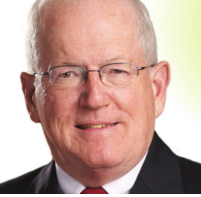New commission will work to bolster trust in election integrity
On April 26, Secretary of State David Scanlan announced the creation of a Commission on Voter Confidence. Scanlan explained that while elections in New Hampshire are transparent and reliable, and traditionally the voters have had great confidence in our processes, recent accusations and publicity have started to erode that trust. The commission is designed to reverse that trend.
Former Ambassador to Denmark and New Hampshire Congressman Richard Swett, a Democrat, and this writer, as chair of the Ballot Law Commission, were named to co-chair the commission. We both expressed confidence in elections here, and explained our hopes for the commission and its work.
The commission hopes to have a series of listening sessions, where voters, representatives of political parties and interest groups and town and city election officials will have the opportunity to state their opinions about elections in New Hampshire. Hopefully, these will allow people from all over New Hampshire to set forth their concerns.
The commission also will hear explanations of how our elections work, what the processes are for training election officials, what the laws and rules are for running elections, selecting “mechanical ballot counting devices,” the legal term for “voting machines” in our statutes, how those devices work, and how elections differ in towns that hand-count ballots and those communities that use the machines. It will learn about how recounts are conducted and, hopefully, the history of election security in the Granite State.
The commission will focus on elections in New Hampshire, not other states. In the process, it is hoped, the hard work and dedication of our local election officials, who do the bulk of the work in running elections, will receive the attention it deserves.
Similar to the Select Committee on Emergency Election Support, which met and made recommendations on how elections should work during the pandemic, this commission will be open to all who wish to address it, and hopes to hear from many of the local officials who can explain and demonstrate their hard work.
New Hampshire election laws are extensive, as anyone who has reviewed them knows. Each year, there are scores of proposals presented to the Legislature. Whether the Commission will propose new laws or changes to existing laws has yet to be determined, as it will go where its findings direct, and it was given no marching orders in that regard by the secretary of state.
Both co-chairs have experience with elections, Swett as a candidate for Congress and the U.S. Senate, son-in-law of a longtime congressman and political activist, and I as a participant in elections in New Hampshire since 1966, occasionally a candidate for local office, counsel to the Republican State Committee in the 1970s, Ballot Law Commission member and supporter of various candidates.
The other members come from a variety of backgrounds and political persuasions.
Ken Eyring is co-founder of the Government Integrity Project and became involved in elections during the recent Windham election controversy.
Andrew Georgevits is chair of the Concord Republican City Committee and an activist who has served in senior leadership roles on presidential campaigns.
Amanda Merrill of Durham, an environmental activist, formerly served as a state representative and state senator.
James Splaine of Portsmouth, former state representative and senator, city councilor and assistant mayor, charter commissioner and activist, authored the legislation that assures New Hampshire’s presidential primary remains first in the nation — which passed in 1975!
Douglass Teschner is president of Growing Leadership, a former Peace Corps director in Ukraine and a former New Hampshire officeholder.
Olivia Zink, city council member and former Franklin mayor, is executive director of Open Democracy, a Concord-based organization that focuses on elections and voter participation issues.
The commission only will be successful if citizens of all political viewpoints participate, and those who have confidence in our elections are as important participants as those who have concerns. The schedule of meetings, all of which will be open to the public and hopefully available on a hybrid basis so in-person and virtual participation will be possible, will be posted on the secretary of state’s website, sos.nh.gov. Minutes of the meetings and recordings of its sessions also will be available.
Please participate. Democracy is not a spectator sport, and confidence in the integrity of elections is essential.
Brad Cook is a Manchester attorney. The views expressed in this column are his own. He can be reached at bradfordcook01@gmail.com.